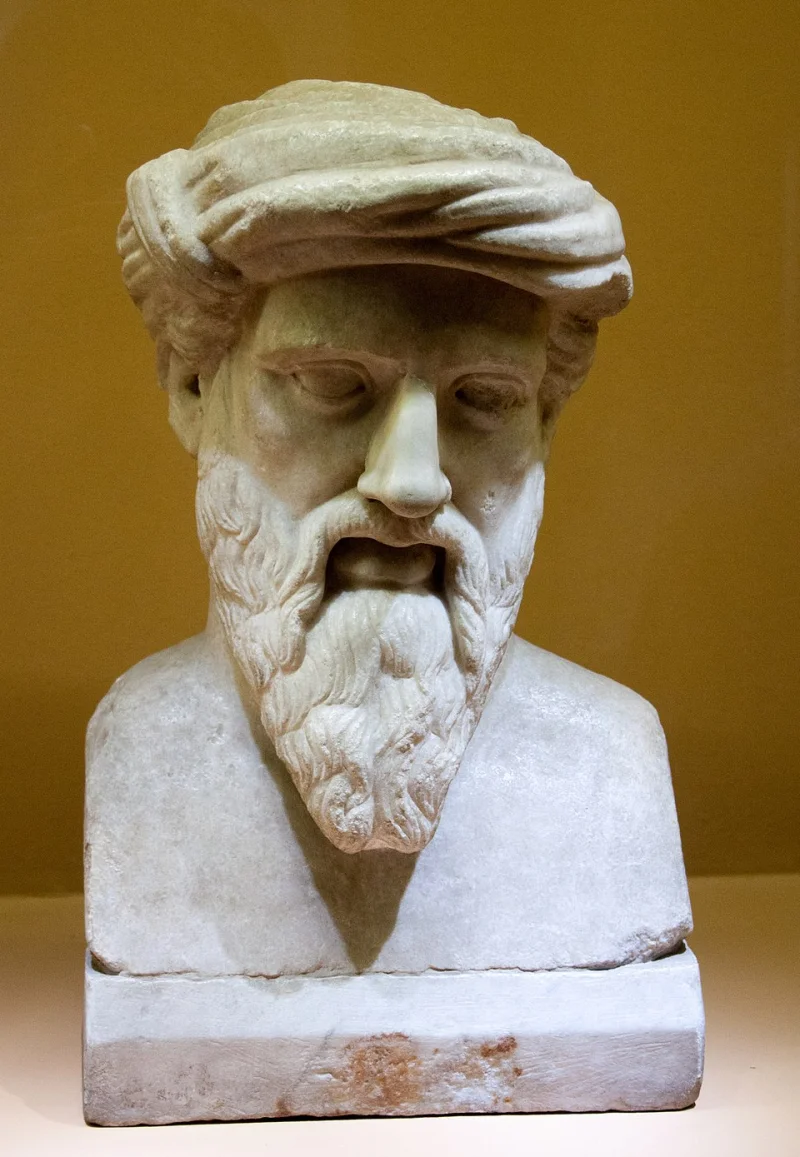Short Summary
Pythagoras was an ancient Greek philosopher and mathematician, best known for formulating the Pythagorean theorem, which is foundational in mathematics. He founded the Pythagorean school, where he and his followers explored mathematics, astronomy, and music theory. His contributions significantly influenced the development of mathematics and Western philosophy. Pythagoras is celebrated for merging mathematical concepts with philosophical inquiry, leaving a lasting impact on both fields.
Early Life & Education
Pythagoras was born around 570 BCE on the island of Samos in the Aegean Sea. His father, Mnesarchus, was a merchant, which allowed Pythagoras to travel extensively during his youth. This exposure to various cultures played a significant role in shaping his intellectual development. He studied under several teachers, including Pherecydes of Syros and Anaximander, who influenced his philosophical and mathematical thinking. His early education was characterized by a keen interest in geometry, numbers, and the mystical aspects of the universe, which later became central themes in his teachings.
Career Highlights
After leaving Samos to escape the tyranny of Polycrates, Pythagoras settled in Croton, a Greek colony in southern Italy. There, he established a religious and philosophical school known as the Pythagorean Brotherhood. This community was both an intellectual hub and a spiritual group, where members adhered to strict rules and communal living. Pythagoras and his followers made significant advances in mathematics, particularly in number theory and geometry. The Pythagorean theorem, attributed to him, remains a fundamental principle in mathematics. His teachings also extended to music, where he studied the mathematical ratios in musical harmony.
Major Achievements
- Development of the Pythagorean theorem: A fundamental mathematical principle relating to right-angled triangles.
- Establishment of the Pythagorean school: A community that combined mathematical, philosophical, and religious teachings.
- Influence on musical theory: Studied the mathematical ratios underlying musical harmony.
- Contribution to number theory: Explored properties of numbers, including concepts of odd, even, and prime numbers.
Famous Quotes
- "The beginning of every government starts with the education of our youth."
- "There is geometry in the humming of the strings, there is music in the spacing of the spheres."
- "Do not say a little in many words but a great deal in few."
Interesting Facts
- Pythagoras believed in the transmigration of souls, a form of reincarnation.
- His followers adhered to a strict lifestyle, including dietary restrictions such as abstaining from beans.
- The Pythagorean school was one of the first to study the mathematical relationships in music.
- Pythagoras's influence extended beyond mathematics to include significant contributions to philosophy and science.
- His school practiced a form of communal living that emphasized equality among its members.
Legacy / Influence
Pythagoras's legacy endures through the lasting impact of his mathematical discoveries and philosophical ideas. The Pythagorean theorem remains a cornerstone of geometry and mathematics education. His integration of mathematical concepts with philosophical inquiry laid groundwork that influenced Plato and Aristotle, shaping Western philosophy. Additionally, his exploration of musical harmony continues to inform music theory. Pythagoras's holistic approach to knowledge has inspired countless scholars over the centuries.
FAQ
Q: Why is Pythagoras famous?
A: He is famous for the Pythagorean theorem and his contributions to mathematics and philosophy.
Q: What is the Pythagorean theorem?
A: It is a mathematical principle stating that in a right-angled triangle, the square of the hypotenuse is equal to the sum of the squares of the other two sides.
Q: What did the Pythagorean school study?
A: The school studied mathematics, philosophy, music, and astronomy, among other disciplines.
Q: Did Pythagoras write any books?
A: Pythagoras did not leave any written records; his teachings were passed down through his followers.












